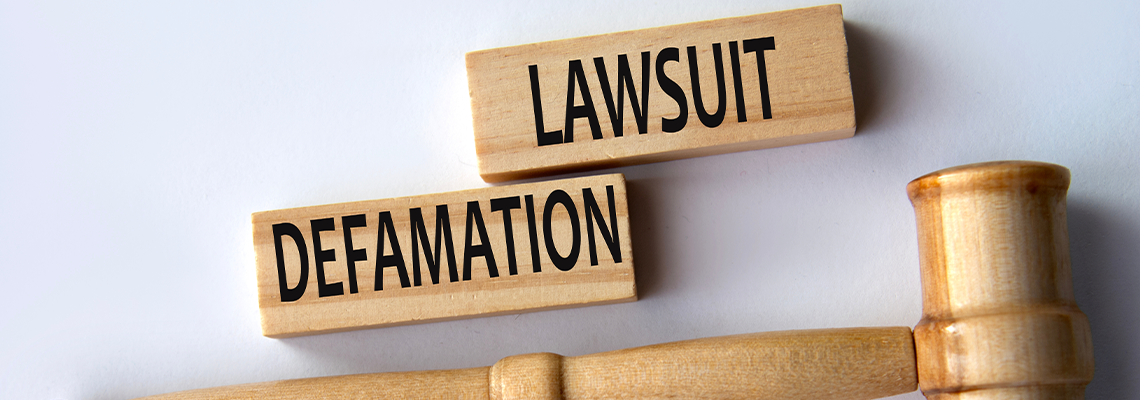Slander vs. Libel
In Canada, defamation is broadly categorized as the communication of a false statement that causes harm to someone's reputation, which can take the form of either slander or libel. Both are forms of defamation and can potentially lead to serious legal consequences. But what's the difference?
The main difference between slander and libel is in the medium through which the defamatory statement is communicated (i.e., spoken versus in writing). At Francis Lawyers, we often encounter queries about these types of defamation and what constitutes one versus the other.
Understanding these differences between the two is important for individuals and organizations to defend themselves against unfounded accusations or pursue litigation for damages resulting from harmful false statements.
Defining Slander
Slander refers to spoken defamation, where the false statement is made verbally or through gestures, but not in writing. This can include untrue statements made during a conversation, on radio or television broadcasts, or in public speeches.
For example, if someone were to accuse a competitor of wrongdoing during a business meeting without proof, and that accusation damages the competitor's reputation, it could constitute slander.
To prove slander in Canada, the following elements must be satisfied:
The statement was made verbally
The statement was made to a third party (i.e., someone other than the person being defamed)
The statement was false
The statement caused harm to the reputation of the individual or organization
Defining Libel
While slander refers to defamatory statements that are made through spoken words, libel pertains to defamatory comments made in written statements or published content. This can include postings on social media platforms, articles in newspapers or magazines, and even emails or letters.
For instance, if someone writes an article that accuses a public figure of corruption without any evidence, and the article impacts the public figure's reputation, it could be considered libel.
In Canada, the following elements must be satisfied to prove libel:
The statement was published or written down (even if not widely distributed)
The statement was referring to a specific person or entity
The statement was false
The statement was harmful to the individual or organization's reputation
It is worth noting that in Canada, truth is a valid defence against both slander and libel. If the statement made is proven to be true, there can be no successful claim of defamation.
Similarities and Differences
Despite their differences, both slander and libel share a common legal foundation. Both require the person claiming defamation to prove that the statement made was untrue and had damaging implications on their reputation. However, the burden of proof and specific legal standards may differ based on the format of the defamation.
For slander cases, the burden of proof often lies with the claimant to demonstrate the falsehood of the statement and the actual harm it inflicted. This can be particularly challenging, as spoken statements can quickly fade, making it difficult to establish a strong case without corroborating strong evidence such as witness testimonials.
In contrast, libel cases typically come with a built-in advantage for determining proof. Since written statements are more permanent than spoken words, it is generally easier to establish a case for harm, as the content can be traced, referenced, and cited.
The claimant may also have a clearer path to demonstrate reputational damage—evidenced by public perception or expert testimonies.
Common Defences Against Slander and Libel Claims
Both slander and libel can have significant impacts on a person or business's reputation. Fortunately, there are established defences available for both types of defamation. These defences may help mitigate or completely dismiss claims based on several legal doctrines:
Truth: This is one of the most powerful defences against both slander and libel. If the statement in question can be proven true, the plaintiff typically cannot prevail in their claim. The defendant will need to gather evidence that robustly supports the truth of their statements.
Opinion: A statement presented as an opinion rather than a fact may also serve as a strong defence. For example, saying "I think that firm is untrustworthy" could be viewed differently than stating, "That firm is stealing clients." Courts often view opinions as generally less damaging to reputations.
Privilege: Certain situations allow for privileged statements that cannot be challenged, such as comments made during court proceedings or parliamentary debates. This privilege is intended to encourage free and candid communication in specific contexts.
Fair comment: This specifically applies to public figures, allowing individuals to express opinions based on true facts without liable repercussions, as long as those comments aren’t made with malicious intent.
Potential Compensation for Slander and Libel
If you or your organization has been the target of slander or libel, there are various damages you can pursue as compensation for defamation. The damages available can vary widely depending on the seriousness of the violation and the evidence substantiating the slander or libel claim.
Some of the types of damages you can seek include:
General damages: These are typically non-economic damages intended to compensate for loss of reputation, emotional distress, and mental anguish caused by the defamatory statement.
Special damages: This type of compensation covers quantifiable losses directly related to the defamatory statement, such as lost wages, lost business opportunities, or any financial hardship attributed to the slanderous or libellous actions.
Punitive damages: In more extreme cases—particularly where the defendant's actions are seen as intentional or malicious—punitive damages may be awarded to serve as a deterrent against similar future behaviour.
The Importance of Legal Representation
Working through a slander or libel case requires an in-depth understanding of Canada's defamation law. Therefore, it's important to seek out experienced legal representation who can help you develop a tailored strategy for contesting the defamatory statements and pursuing compensation.
At Francis Lawyers, our team of skilled civil litigation lawyers is committed to providing the support you need throughout this process. We will strive to help you strategically assess your case, guide you through proving your claims or mounting a defence, and keep you informed every step of the way.
Experienced Legal Representation in Ottawa, Canada
Understanding the differences between slander and libel is essential if you're facing potential defamation claims or dealing with fallout from harmful statements. At Francis Lawyers, we aim to empower our clients with the knowledge they need and provide robust legal representation tailored to their unique circumstances.
Whether you've been falsely accused or you're seeking recourse for unwarranted damage to your reputation, reach out to our firm today to schedule a consultation.
Located in Ottawa, Canada, we serve clients throughout the Ottawa area including Gatineau, Chelsea, Dunrobin, Kinburn, Arnprior, Munster, Kempville, Ficko, Edward, and Cumberland Ward, as well as the Toronto area.



